
Information has been provided for this page by one of his granddaughters:
Crystal Thompson 970-987-9760
Everett married Betty (Mayo), together they had 4 children..Rita,Willis, Paula and Sandy.
‘The badge is yours, the gun is mine.’
Everett Morrow, legendary
and lamented town marshal, dies
By Katie Klingsporn
Associate
Editor Mar 27, 2011 Telluride
Daily Planet
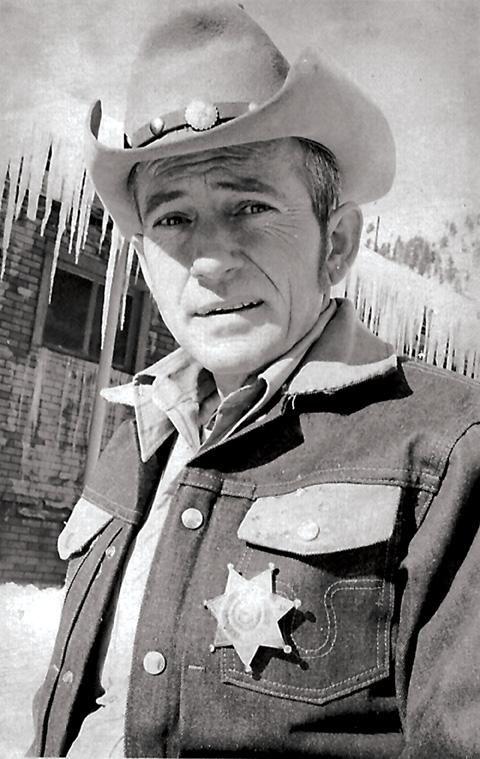
Everett Morrow was small in stature. But he wore a big Stetson,
carried a sizeable pistol and had personality enough to stamp an
indelible impression on anyone who knew him.
Morrow, Telluride’s
hard-nosed marshal who governed the streets with a tough and singular
style in the transitional period of the early ‘70s, died on March 13 in
his sleep in Parachute, Colo. He was 80.
Morrow remains one of
the most colorful characters of Telluride’s history, specifically the
early ‘70s, a time of upheaval as the culture of mining was usurped by
the development of a ski resort and a flood of young newcomers.
Stories about the marshal, who was known for his strong Oklahoma
accent, tin star and tendency to harass hippies, still trail him in the
streets of Telluride today, decades after he left.
He is seen by
some as a pivotal figure whose actions galvanized the new population to
organize politically — setting the tone for what the town would become.
And he no doubt represented the focal point of the struggle that existed
in those days between the new and the old.
But despite stories of
long-hairs getting hassled by the sometimes-questionable tactics of
Morrow, those who remember him do so with fondness.
“Despite the
fact that he was the symbol of authority, we had quite a bit of respect
for him,” said George Greenbank, who moved to Telluride in the summer of
’71 straight from college. “He never shot any of us, which I think was
really commendable considering how out-there we were. Those were heavy,
heavy times. And he did a good job.”
“He was a character for sure
out of the Old West,” said Dick Unruh, another long-time local.
“Everybody that ever met him has a story or more about him.”
In the early 1970s, Morrow was actually a bit of a newcomer himself. He
had moved to Telluride to work as the marshal — and the lore is that the
town council hired him specifically to deal with the overwhelming influx
of young people. To keep the hippies in line, in other words.
But
his roots were in Oklahoma; he was born in 1931 in a town called El
Reno, fought in the Korean War and married Betty Jo Mayo in 1949. They
lived in Oklahoma, Maryland and Texas before settling down in Colorado,
where he worked as a marshal in other towns.
He moved to
Telluride with his wife and children, and patrolled the streets in the
early ‘70s. He was a cowboy, drove a Ford Falcon and wasn’t shy about
his suspicions of new faces and long hair. People recall being pulled
over on their first drive into town and told to leave. Others remember
him following them not inconspicuously as they went about their daily
business.
“He was pretty visible in the old days,” Greenbank
said. He remembers in ’71, when he and his roommate, Bracken Raleigh,
would make daily trips to the grocery store for breakfast supplies.
Morrow would be there, trailing them.
Unruh, meanwhile, first
rolled into town with a couple friends from Aspen in April of 1972 to
check out the Miner’s Union, which was for sale. One of his friends made
an inquiry about daily deposits at a bank, and the bank must have
alerted Morrow, because suddenly there he was, eyeing them warily. Unruh
approached him to say hello, and Morrow informed him that if he and his
friends were thinking about robbing the bank, he had a pursuit vehicle
that would catch them before they even got out of the valley.
But for Morrow, he was just doing his job: keeping the town clean of
drugs and crime. And there were people who admired him for it.
“He was really suspicious of all the new people coming into town … he
came here to protect the town,” said Scott Smith, who was born and
raised in Ophir and was a student in high school with Morrow’s
daughters.
Smith wasn’t a rabble-rouser, and didn’t catch the
attention of the marshal. He remembers him as a straight-laced man with
a drawl and a devotion to his job.
“He was a good-hearted guy and
his family was great,” Smith said. “He was a fascinating guy, a
character and a half. He was a good man.”
The trove of Everett
Morrow stories is brimming.
There was that incident late one
night in 1973 when a man named William Woodson shot his wife in the head
at the Sheridan Hotel. Morrow set out on a manhunt for the suspect, but
didn’t bother to tell San Miguel County Sheriff Fred Ellerd, with whom
he had a strained relationship.
After looking for Woodson all
night, Morrow spotted him at the Ore Bucket Restaurant the next morning
and told him to surrender — but the man fled to the basement. Without
notifying other officers or clearing the street, Morrow armed a local
blacksmith with a shotgun and told him to keep watch, tossed tear gas
grenades into the building and crouched outside with his gun drawn — all
while morning’s traffic passed by gaping.
There was the time that
he orchestrated a massive liquor bust, having 20-year-old Wayne Webb —
whom the Telluride Times described as having a receding hairline and a
much older demeanor — walk into every nearly every liquor-serving
establishment in town and order a drink.
The bust ensnared every
establishment except two, and it outraged the community so much that a
special meeting was held where the public criticized Morrow for
trampling their rights and pled with the council to do something. His
defense was that he had busted everyone in order to demonstrate that he
wasn’t out for anyone in particular.
One day in 1973, Morrow shot
a deer that had jumped the fence across the highway, to the horror of
some young transplants who were trying to herd it back into the meadow
where it came from.
One of the witnesses, Wayne Watkins, a
former newspaper photographer, was so upset by the incident that he and
friends loaded the dead deer into his Jeep and hauled it onto the
Sheridan Bar — telling anyone who walked in that night how it met its
death.
By 1974, many newcomers were fed up with what they saw as
ugly politics and law enforcement in town. The atmosphere spurred them
to organize politically.
Everyone registered to vote, Greenbank
said, and a group of progressive young people ran a slate of candidates
for six council seats and that of the mayor.
The group was
elected to five of seven seats, including mayor (Jerry Rosenfeld), and
the complexion of local politics was forever altered.
Greenbank
was one of the newly elected. Immediately following the swearing in of
the new council, he said, an emergency meeting was held, and the
council’s first order of business was to fire Morrow.
The
marshal ended his tenure in unforgettable fashion.
He indignantly
tossed his badge across the chamber floor toward the council, Greenbank
recalls. Then his hand went to his gun, and he uttered words that have
now become famous: “The badge is yours, the gun is mine.”
“We
still haven’t gotten that gun back,” Greenbank said.
Rick
Silverman said that though he caused people a lot of trouble, Morrow can
be credited as galvanizing people to political action.
“For
Telluride to take that direction, in many ways it can be traced to
Everett,” he said.
In the mid-70s, Morrow moved to Parachute,
where he would continue to live for the rest of his life. He worked as a
marshal there until the early 1980s, and then worked as an auctioneer
for several years before working for Unocal during the oil shale boom.
He is remembered by his family as a man who loved horses and animals
and taught his children and grandchildren how to ride.
“He really
enjoyed his horses and he always had a dog he was training,” said Linda
Cannizzaro, his niece.
He was also known around Parachute for
raising the biggest turkeys in town — kids would come by his yard just
to gawk at them. And he was always willing to help out.
“He was a
good fellow,” she said. “He was always out helping neighbors and
involved with the community.”
Morrow is survived by brothers
Rueben Morrow, Paul Morrow and children Rita Parsons, Willis Morrow,
Paula Thompson and Sandy Carnes, as well as 10 grandchildren and 23
great grandchildren.
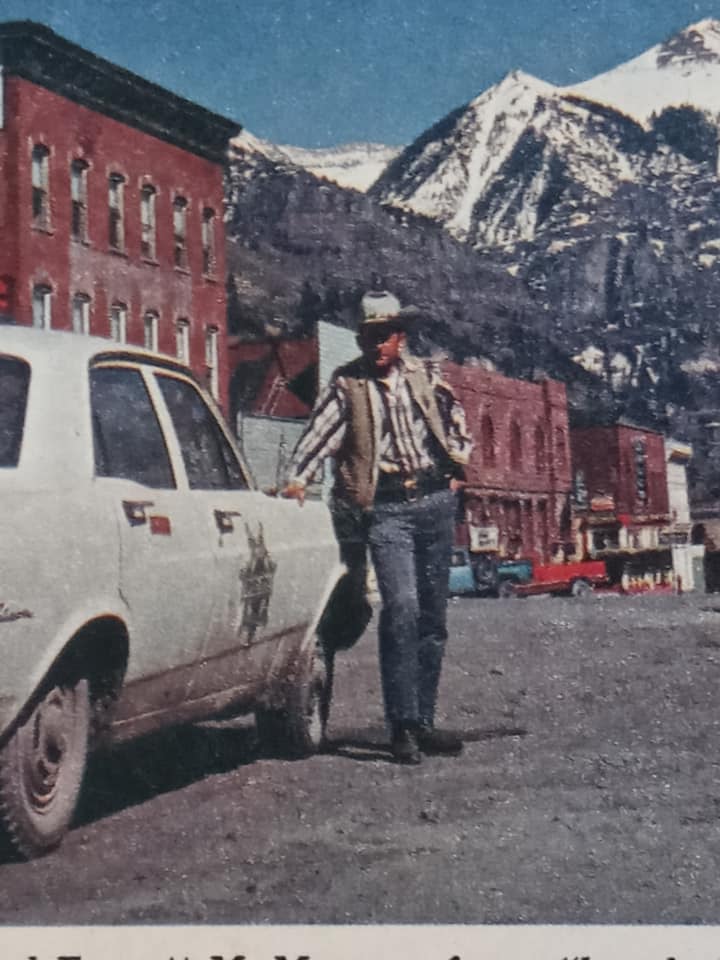 Everett Morrow - Town Marshal Telluride Colorado
Everett Morrow - Town Marshal Telluride Colorado
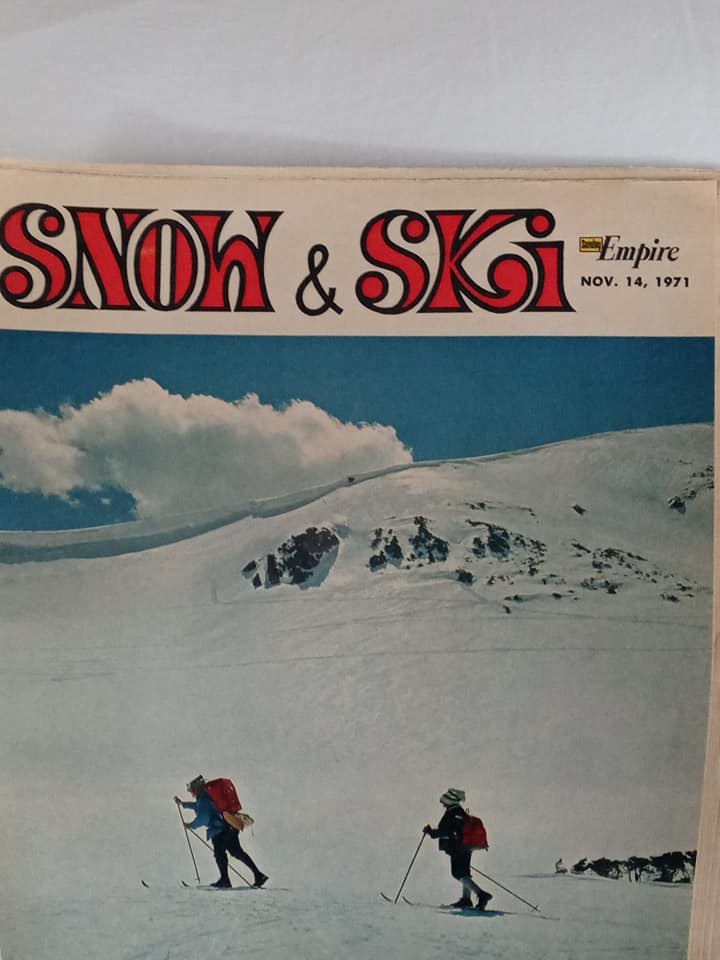
This is the magazine the picture of Everett was in... SNOW & SKI November 14, 1971 from Debbie Duncan Boyd who added:
Telluride, Colorado 1971
Everett Morrow, Town Marshal
His
License Plate read NO. 1 and his Bumper Sticker read: If you don't like
Cops, the next time you're in trouble, Call a Hippie (Excerpt from The
New York Times)
I knew him as a Cop, but he was also my best friend's
Paula Thompson, and Sandy Morrow Carnes, Dad. He was also Cousin Daisy
Goldsworthy's daughter, Jennifer Summerville's Grandpa!! He was a
Character, and Life wouldn't have been the same, without him in it!♥️♥️
Everett Morrow
1931-2011
R.I.P.
****************************************************************************************

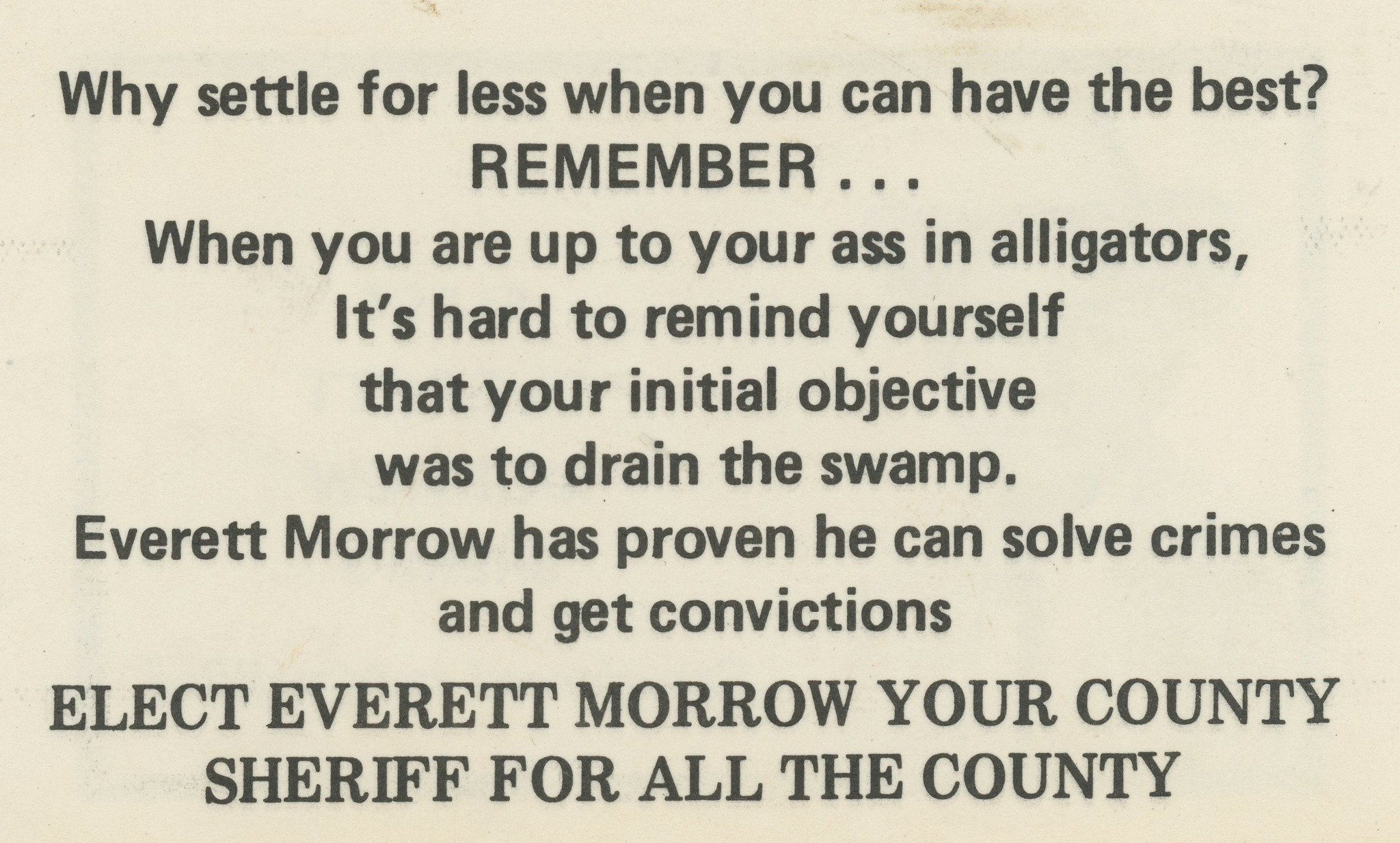
Everett Morrow is fondly remembered by many. Here is an
article written in the Daily Sentinel back in 1982
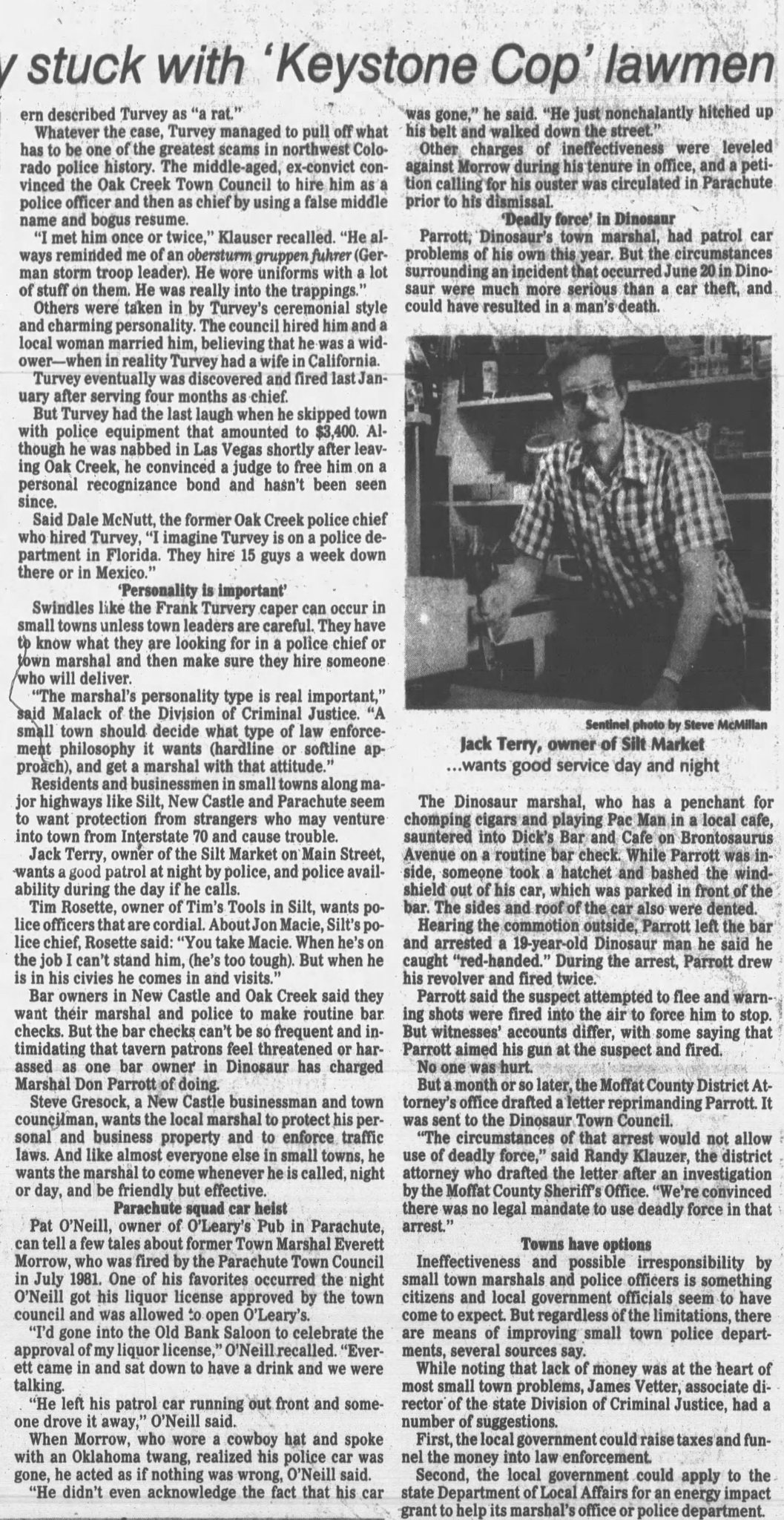
Everett Milton Morrow
January 2, 1931 - March 13, 2011
Everett
Milton Morrow, long time Parachute resident and one time marshal, passed
away there peacefully in his sleep March 13, 2011, at age 80.
Everett
was born January 2, 1931, to James Leslie and Allie Dora Morrow, in El
Reno, Oklahoma.
He is survived by brothers, Rueben Vester Morrow
(KS); Paul Ray Morrow (CO); sister, Ellen Marcel Crawford (MI), and
children, Rita Parsons (Berthoud); Willis Morrow (Parachute); Paula
Thompson (Rifle), and Sandy Carnes (Ft. Meyers, FL), and his ten
grandchildren and 23 great grandchildren. He will also be missed by
Carmen Abuda and his nieces and nephews.
He joined the Army Air Force
in 1946 to do his patriotic duty for the Korean War. His tombstone
inaccurately is inscribed WW2, however, he was 10 years old, almost 11
when the US entered WW2. He was still just 15 going on 16 when he did
join the service.
When he was discharged in 1949 he went back home
and married Betty Jo Mayo (d.1991). They lived in Oklahoma, Maryland,
and Texas before deciding to settle down in Colorado.
Everett had
worked as a welder and auctioneer, but is best remembered as a small
town marshal. He was the town marshal in Frederick, CO, Telluride CO,
thenj Parachute CO.
He moved to Telluride in the early 70's where he
won election as marshal running as an independent. Telluride was a drug
haven back then and his attempts to eliminate drug use clashed with the
town council. He was fired in 1974. He famously threw his badge at the
council saying "the badge is yours, the gun is mine.” Telluride never
did get their gun back.
In 1974, Everett moved to Parachute as town
marshal. He would continue to live in Parachute 37 years, all the rest
of his life. He was marshal until 1981 when he was dismissed.
He
then worked as an auctioneer several years before working for Unocal
during the oil shale boom.
He was known around Parachute for raising
the biggest turkeys in town. Kids would come by his yard just to gawk at
them, and he was always willing to help out.
Everett enjoyed working
with horses and sharing his knowledge with any family member or neighbor
who expressed an interest.
His other interest included participating
in the training of dogs to be used in police work. He even had the first
canine partner in Garfield County.
His memorial service was held at
the Veteran's Memorial Cemetery of Western Colorado, located at 2830 D.
Rd Grand Junction CO, on March 24, 2011.
If you have questions, contributions, or problems with this site, email:
Coordinator - Rebecca Maloney
State Coordinator: Colleen Pustola
Asst. State Coordinators: Rebecca Maloney - Betty Baker - M.D. Monk
If you have questions or problems with this site, email the County Coordinator. Please to not ask for specfic research on your family. I am unable to do your personal research.
